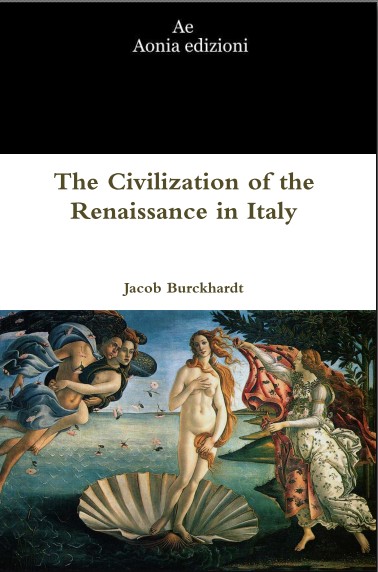Carl Jacob Christoph Burckhardt (May 25, 1818 - August 8, 1897) was a historian of art and culture, and an influential figure in the historiography of each field. He is known as one of the major progenitors of cultural history. Siegfried Giedion described Burckhardt's achievement in the following terms: "The great discoverer of the age of the Renaissance, he first showed how a period should be treated in its entirety, with regard not only for its painting, sculpture and architecture, but for the social institutions of its daily life as well." Burckhardt's best known work is The Civilization of the Renaissance in Italy (1860).
| Libro Italia € 11,99 (lo compro qui) E-book Italia € 0,89 (lo compro qui) Amazon Italia € 11,99 (lo compro qui) | Libro USA $ 12,99 (lo compro qui) E-book USA $ 0,99 (lo compro qui) E-book Germania € 0,89 (lo compro qui) |
| Libro Germania € 12,49 (lo compro qui) Libro Regno Unito £ 10,99 (lo compro qui) E-book Regno Unito £ 0,77 (lo compro qui) | Libro Francia € 11,99 (lo compro qui) Libro Spagna € 11,99 (lo compro qui) Libro Austria € 11,99 (lo compro qui) |
This work bears the title of an essay in the strictest sense of the word. No one is more conscious than the writer with what limited means and strength he has addressed himself to a task so arduous. And even if he could look with greater confidence upon his own researches, he would hardly thereby feel more assured of the approval of competent judges. To each eye, perhaps, the outlines of a given civilization present a different picture; and in treating of a civilization which is the mother of our own, and whose influence is still at work among us, it is unavoidable that individual judgement and feeling should tell every moment both on the writer and on the reader. In the wide ocean upon which we venture, the possible ways and directions are many; and the same studies which have served for this work might easily, in other hands, not only receive a wholly different treatment and application, but lead also to essentially different conclusions. Such indeed is the importance of the subject that it still calls for fresh investigation, and may be studied with advantage from the most varied points of view. Meanwhile we are content if a patient hearing is granted us, and if this book be taken and judged as a whole. It is the most serious difficulty of the history of civilization that a great intellectual process must be broken up into single, and often into what seem arbitrary categories in order to be in any way intelligible. It was formerly our intention to fill up the gaps in this book by a special work on the 'Art of the Renaissance', an intention, however, which we have been able to fulfill only in part.




